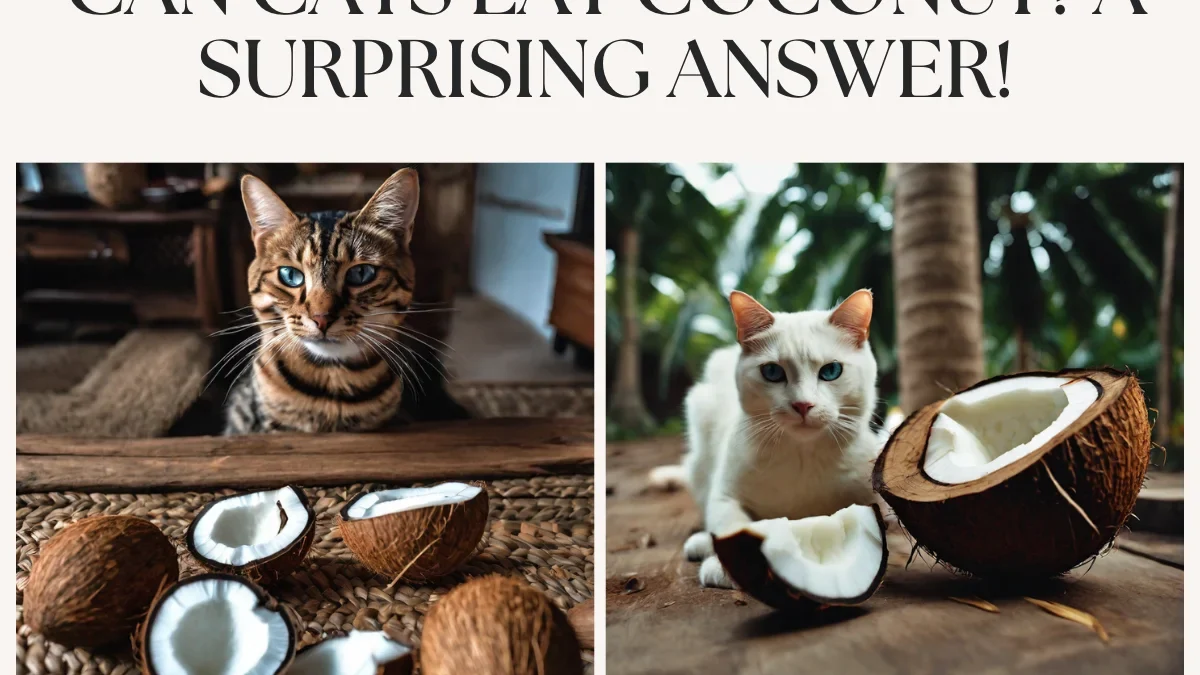When it comes to our feline friends, we often wonder about what they can and cannot eat. With the increasing popularity of coconut and its various forms, many cat owners have started to wonder: can cats eat coconut? And what about coconut oil? Is it safe for cats to consume? In this blog post, we’ll explore the surprising answers to these questions and provide you with all the information you need to know before feeding your cat any form of coconut. So, if you’re a cat owner who loves coconut and wants to share it with your furry companion, keep reading to find out if it’s a safe option for them.

Table of Contents
Can Cats Eat Coconut? Short answer
Cats can technically eat coconut, but it is not recommended to make it a regular part of their diet. While coconut in small amounts may not be harmful to cats, it is important to remember that they have specific dietary needs that may not be met by this tropical fruit.
Coconut contains medium-chain fatty acids (MCFA), which can be beneficial for humans, but cats have different metabolisms and may not be able to efficiently digest and process these fatty acids. This can lead to digestive issues such as diarrhea or an upset stomach.
Additionally, coconut milk and coconut ice cream, which are often made from processed coconut, can contain added sugars or other ingredients that are not suitable for feline consumption. These can lead to weight gain, diabetes, or other health problems.
While there are potential health benefits of coconut for cats, such as promoting healthy skin and coat or supporting their immune system, it is best to consult with your veterinarian before introducing coconut into your cat’s diet. They can guide the appropriate amount and form of coconut that may be safe for your furry friend.
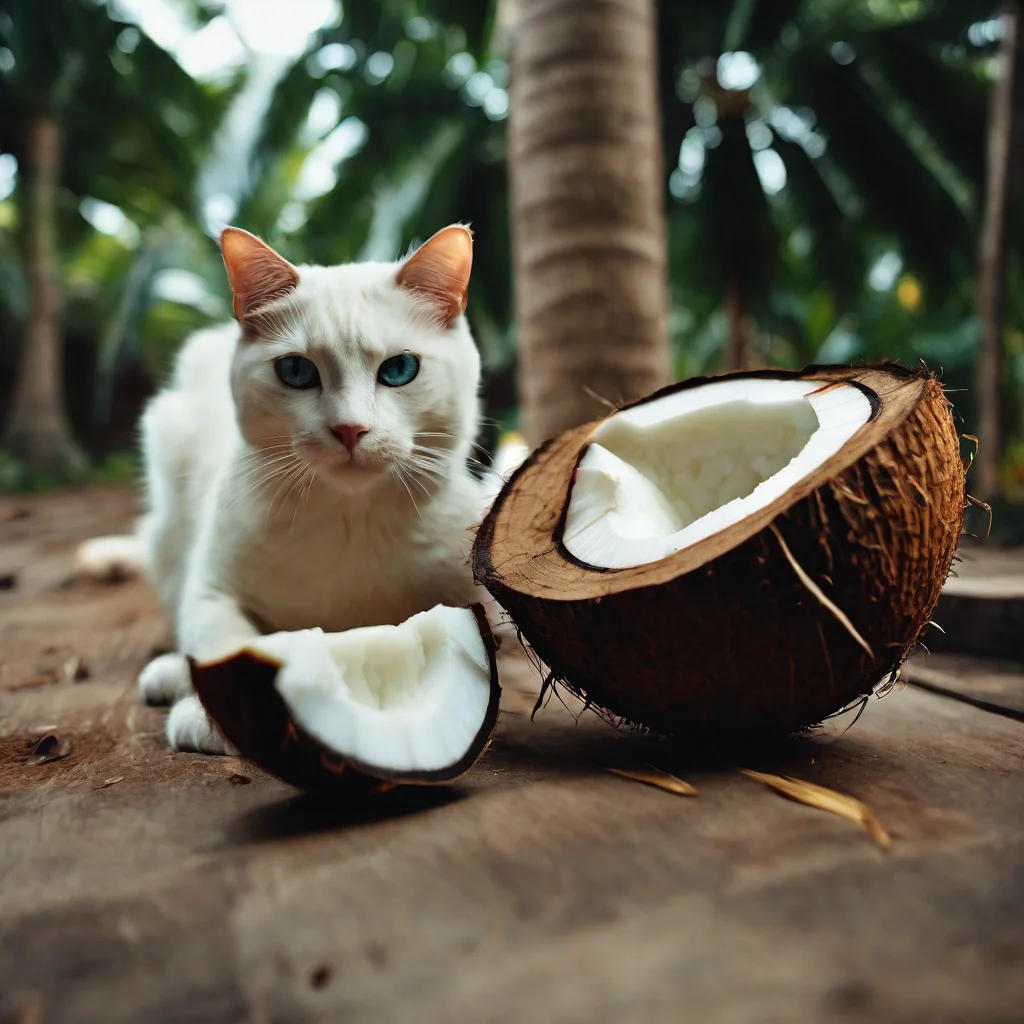
Understanding a Cat’s Digestive System
To understand whether cats can eat coconut, it’s important to have some knowledge about their digestive system. Unlike humans, cats are obligate carnivores, which means their bodies are specifically designed to thrive on a meat-based diet. Their digestive systems have evolved to efficiently break down and process animal proteins and fats, making them highly specialized hunters.
Cats have shorter digestive tracts compared to humans, which means food moves through their system relatively quickly. Their bodies are designed to extract nutrients from meat and absorb them efficiently. This is why cats require high levels of animal-based proteins in their diet to meet their nutritional needs.
When it comes to coconut, cats may have a difficult time digesting it due to the high levels of fiber and fat it contains. While coconut milk and coconut ice cream may be enticing treats for humans, they can be problematic for cats. Coconut milk and coconut ice cream are often made from processed coconut, which can contain added sugars or other ingredients that are not suitable for feline consumption. These additional ingredients can lead to weight gain, diabetes, or other health problems.
Given their unique digestive system and nutritional requirements, it’s best to avoid feeding cats coconut milk or coconut ice cream. Instead, focus on providing them with a balanced, meat-based diet that fulfills their nutritional needs. Remember, consulting with a veterinarian is always a good idea before introducing any new food into your cat’s diet. They can provide expert advice and guidance on what is safe and healthy for your furry friend.
The Nutritional Value of Coconuts for Cats
Coconuts have gained popularity for their numerous health benefits in humans, but what about our feline friends? When it comes to the nutritional value of coconuts for cats, it’s important to take a closer look at what they have to offer.
Firstly, coconuts are rich in medium-chain fatty acids (MCFA). While cats may not efficiently digest and process these fatty acids, there is still potential for them to benefit from them. MCFA can promote healthy skin and coats in cats, making their fur shinier and reducing the occurrence of dry, flaky skin. Additionally, MCFA can support a cat’s immune system, helping them fight off infections and diseases.
Coconuts are also a good source of fiber. Fiber is essential for maintaining healthy digestion in cats and preventing issues such as constipation. It can also help regulate blood sugar levels and promote a healthy weight. However, it’s important to note that too much fiber can have the opposite effect and lead to diarrhea or other digestive problems. So, when incorporating coconut into your cat’s diet, it’s crucial to do so in moderation.
Furthermore, coconuts contain essential vitamins and minerals that are beneficial for cats. They are a good source of potassium, which is important for maintaining proper muscle function and regulating blood pressure. Coconuts also contain vitamins C and E, which are antioxidants that can help support a cat’s overall health and well-being.
Overall, while coconuts do offer some nutritional value for cats, it’s essential to remember that they should only be a small part of their diet. Consulting with a veterinarian is the best way to determine the appropriate amount of coconut that is safe and healthy for your feline friend. So, go ahead and introduce coconut into your cat’s diet, but remember to do so in moderation and always prioritize their specific dietary needs.
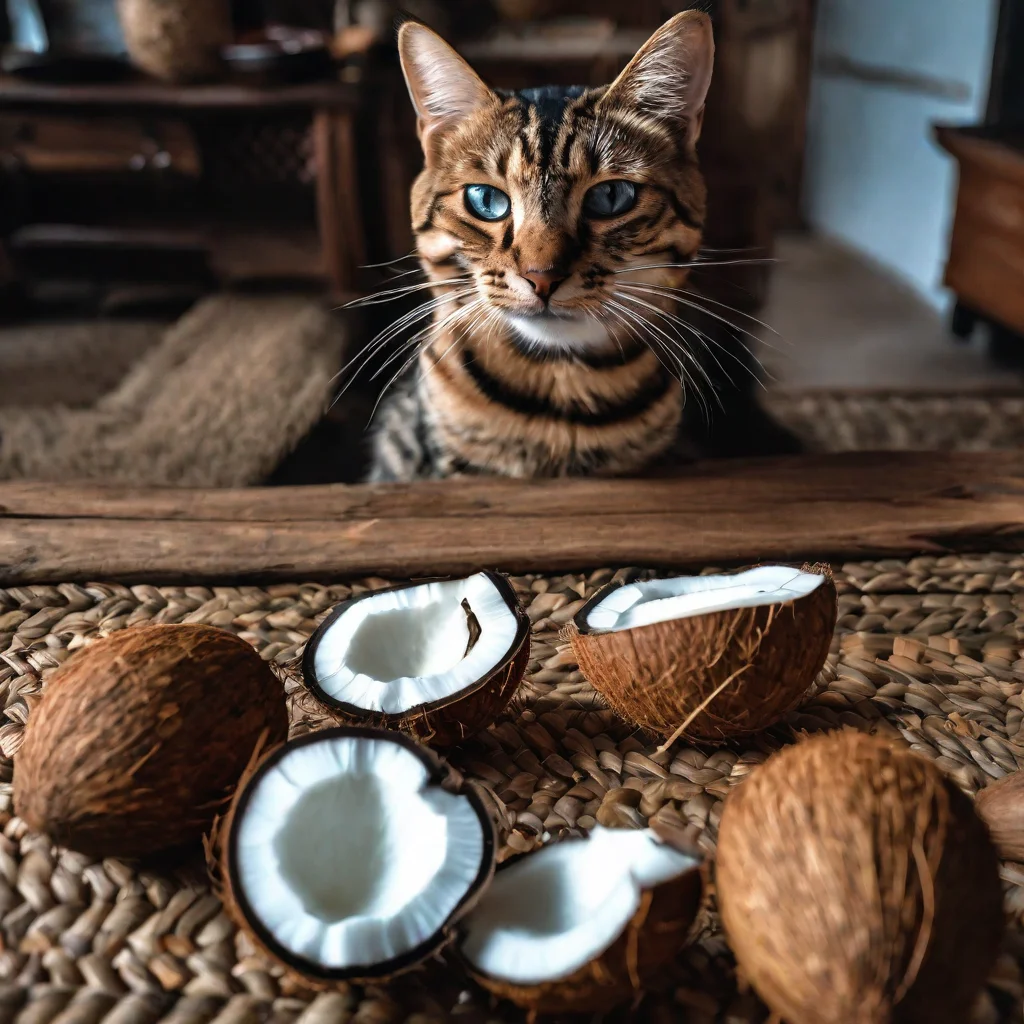
Possible Health Benefits of Coconut for Your Feline Friend
Coconut has become a popular superfood for humans, but what about our feline friends? Believe it or not, coconut can offer some potential health benefits for cats as well.
One of the main health benefits of coconut for cats is its ability to promote healthy skin and coat. Coconuts are rich in medium-chain fatty acids (MCFA), which can help make a cat’s fur shinier and reduce the occurrence of dry, flaky skin. These fatty acids also have antimicrobial properties, which can help protect the skin from infections or irritations.
In addition to promoting healthy skin, coconut can also support a cat’s immune system. The MCFA found in coconuts can help boost a cat’s immune response, making them more resistant to infections and diseases. This can be especially beneficial for older cats or cats with weakened immune systems.
Coconut is also a good source of fiber, which is important for maintaining healthy digestion in cats. Fiber can help prevent issues like constipation and regulate blood sugar levels. It can also promote a healthy weight by providing a feeling of fullness and reducing overeating.
Lastly, coconuts contain essential vitamins and minerals that are beneficial for cats. They are a good source of potassium, which is important for maintaining proper muscle function and regulating blood pressure. Coconuts also contain vitamins C and E, which are antioxidants that can help support a cat’s overall health and well-being.
While coconut does offer some potential health benefits for cats, it’s important to remember that it should only be a small part of their diet. Always consult with your veterinarian before introducing coconut into your cat’s diet to ensure it is safe and appropriate for your furry friend.
Potential Risks of Feeding Your Cat Coconuts
While there are potential health benefits to feeding your cat coconut, it is important to be aware of the potential risks involved. One of the main concerns is the high-fat content in coconut. Cats have specific dietary needs, and their bodies are not designed to efficiently digest and process high amounts of fat. Feeding your cat too much coconut could lead to digestive issues such as diarrhea or an upset stomach.
Another risk to consider is the potential for coconut to contain added sugars or other ingredients that are not suitable for feline consumption. Coconut milk and coconut ice cream, for example, are often made from processed coconut and can contain ingredients that are harmful to cats. These additional ingredients can lead to weight gain, diabetes, or other health problems.
Additionally, some cats may have allergies or sensitivities to coconut. If you notice any signs of an allergic reaction such as itching, skin irritations, or vomiting after feeding your cat coconut, it is important to stop feeding it immediately and consult with your veterinarian.
Lastly, it is always a good idea to consult with your veterinarian before introducing any new food into your cat’s diet. They can guide the appropriate amount and form of coconut that may be safe for your furry friend.
In summary, while coconut does offer potential health benefits for cats, it is important to be aware of the potential risks involved. Feeding coconut in moderation and consulting with your veterinarian can help ensure that it is a safe and healthy addition to your cat’s diet.
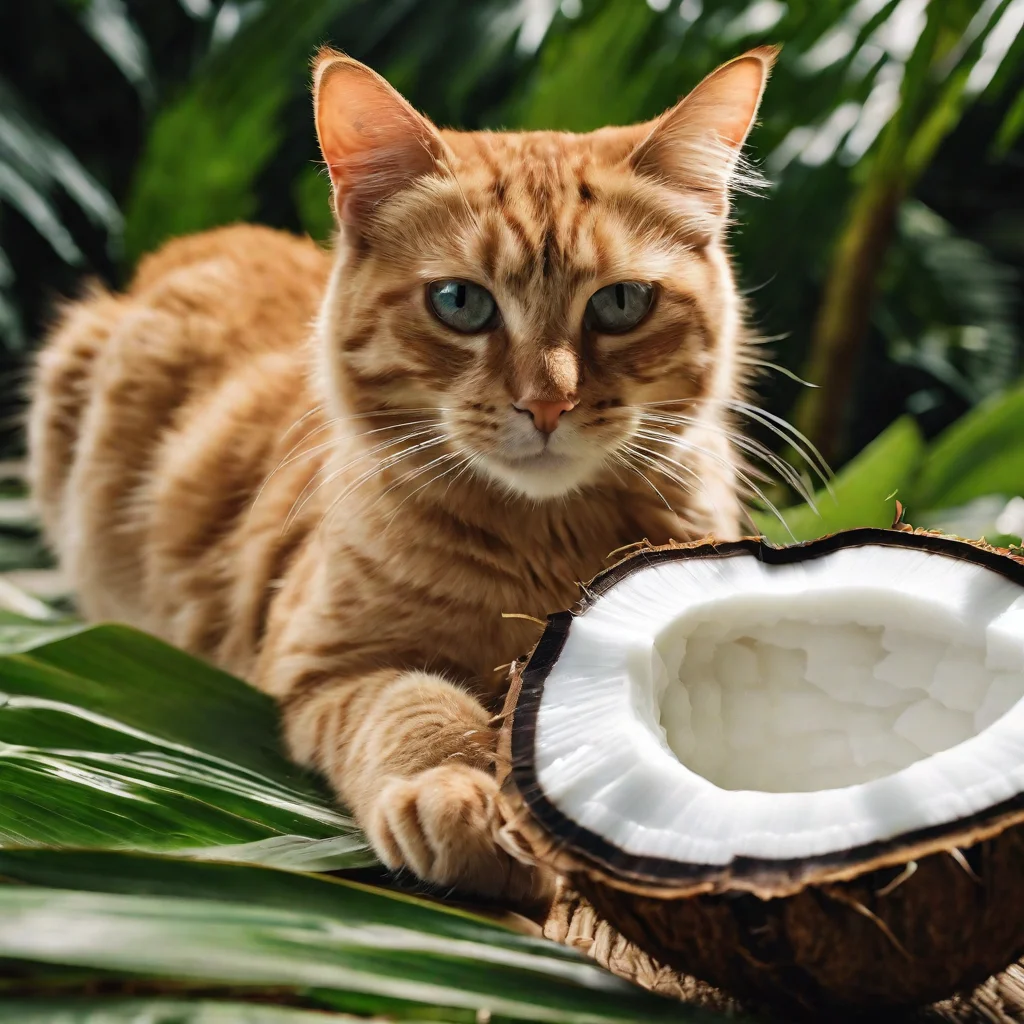
Serving Suggestions: How to Safely Introduce Coconut into Your Cat’s Diet
If you’ve consulted with your veterinarian and decided to introduce coconut into your cat’s diet, it’s important to do so safely and in moderation. Here are some serving suggestions to help you incorporate coconut into your furry friend’s meals:
- Start small: Begin by offering your cat a small amount of coconut, such as a teaspoon or less, to see how they react. Watch for any signs of digestive upset or allergic reactions. If they tolerate it well, you can gradually increase the amount over time.
- Choose fresh, unsweetened coconut: Opt for fresh coconut over processed coconut products like coconut milk or coconut ice cream. Fresh coconut contains fewer additives and is a more natural form of coconut for your cat to consume.
- Shred or grate the coconut: Cats have small mouths, so it’s best to shred or grate the coconut into small, easily chewable pieces. This will help prevent any choking hazards or difficulties in digesting the coconut.
- Mix it with their regular food: Instead of offering coconut as a standalone treat, mix it into your cat’s regular food. This will help ensure they still receive a balanced and complete meal while enjoying the benefits of coconut.
- Monitor their response: Keep an eye on your cat after introducing coconut into their diet. Watch for any changes in their appetite, behavior, or litter box habits. If you notice any negative reactions, consult with your veterinarian to determine if coconut is the cause.
Remember, each cat is unique, and what works for one may not work for another. It’s crucial to pay attention to your cat’s individual needs and consult with your veterinarian for personalized advice. By introducing coconut into your cat’s diet safely and in moderation, you can provide them with a tasty treat that offers potential health benefits.
Signs Your Cat Might be Allergic to Coconuts
If you’re thinking about introducing coconut into your cat’s diet, it’s important to be aware of the potential signs of an allergic reaction. Just like humans, cats can have allergies too, and coconut is no exception. Here are some signs that your cat might be allergic to coconuts:
- Itching and scratching: One of the most common signs of an allergic reaction in cats is excessive itching and scratching. If you notice that your cat is constantly scratching or licking themselves after consuming coconut, it could be a sign of an allergic response.
- Skin irritations: Allergies can cause skin irritations in cats, such as redness, rashes, or inflamed areas. Keep an eye out for any changes in your cat’s skin after they’ve had coconut. If you notice any abnormalities, it’s best to consult with your veterinarian.
- Vomiting or diarrhea: Digestive issues, such as vomiting or diarrhea, can be a result of an allergic reaction. If your cat experiences these symptoms shortly after consuming coconut, it’s important to discontinue the coconut and seek veterinary advice.
- Respiratory problems: Some cats may develop respiratory problems as a result of an allergic reaction. If you notice your cat coughing, wheezing, or having difficulty breathing after consuming coconut, it could be a sign of an allergy.
- Swelling or facial itching: Allergic reactions can sometimes cause facial swelling or itching in cats. Pay attention to your cat’s face and look out for any signs of swelling, redness, or excessive scratching.
If you notice any of these signs after feeding your cat coconut, it’s important to stop giving it to them immediately and consult with your veterinarian. They can help determine if your cat is indeed allergic to coconuts and provide guidance on the best course of action.
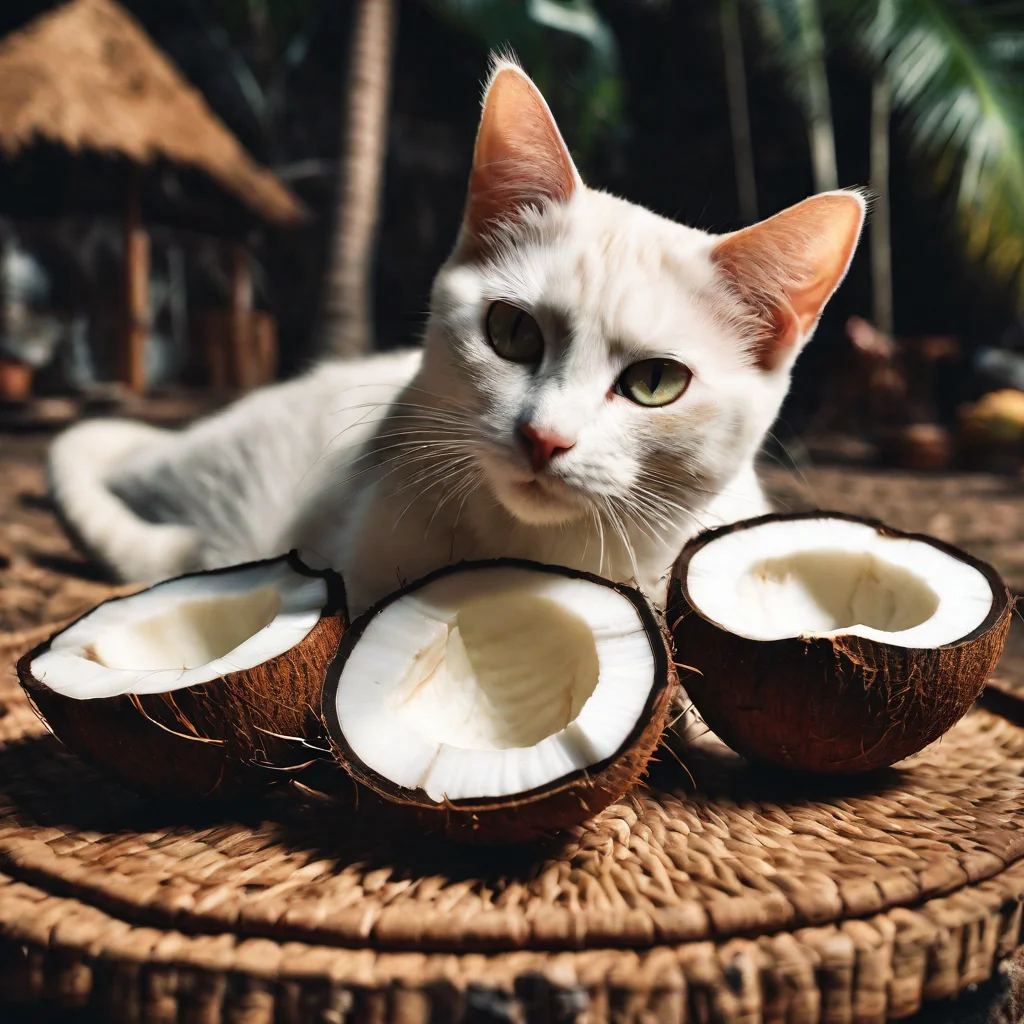
Consulting With a Vet: When and Why
When it comes to introducing new foods into your cat’s diet, it’s always a good idea to consult with your veterinarian. They are the experts when it comes to understanding your cat’s unique dietary needs and can provide you with personalized advice. Consulting with a vet is especially important when it comes to feeding your cat coconut, as it may not be suitable for every cat.
A veterinarian can help determine if your cat has any specific dietary restrictions or health conditions that may be affected by consuming coconut. They can assess your cat’s overall health and consider factors such as age, weight, and any pre-existing conditions. This information will help them provide you with the most accurate guidance on whether coconut is safe for your furry friend.
Additionally, a vet can help you determine the appropriate amount and form of coconut to feed your cat. They can provide you with guidelines on portion sizes and how frequently you can incorporate coconut into their diet. They may also recommend specific brands or products that are safe and suitable for cats.
It’s important to remember that every cat is different, and what works for one cat may not work for another. Consulting with a veterinarian ensures that you are making informed decisions that prioritize your cat’s health and well-being. So, before introducing coconut into your cat’s diet, schedule an appointment with your vet and get their expert opinion. Your cat will thank you for it!
Coconut Treats: Yay or Nay?
Coconut treats for cats – are they a yay or nay? We’ve covered the potential benefits and risks of feeding your cat coconut, but what about coconut treats specifically? Can you give your feline friend a tasty coconut treat without worry? Let’s find out!
When it comes to coconut treats, it’s important to approach them with caution. While cats can technically eat coconut, it’s essential to remember that they have specific dietary needs. Coconut treats may contain additional ingredients, such as sugars or artificial flavors, that can be harmful to your cat’s health. These ingredients can lead to weight gain, diabetes, or other health problems.
If you’re considering coconut treats for your cat, opt for treats specifically made for feline consumption. Look for treats that use minimal, natural ingredients and avoid added sugars or artificial additives. Always read the label and make sure the treat is appropriate for your cat’s size and age.
Remember, moderation is key. Treats should only make up a small portion of your cat’s overall diet. While coconut treats can be an occasional indulgence, they should not replace a balanced and nutritious meal.
As always, consult with your veterinarian before introducing any new treats into your cat’s diet. They can guide the best options for your cat’s specific needs and ensure that you’re making choices that prioritize their health and well-being.
In summary, coconut treats for cats can be a yay, but only if you choose the right ones and feed them in moderation. So, go ahead and spoil your feline friend with a coconut treat, but remember to always prioritize their dietary needs and consult with your vet. Your cat will appreciate the special treat, and you can have peace of mind knowing that you’re making informed choices for their health.
Conclusion
After exploring the potential benefits and risks of feeding cats coconut, it is clear that the answer to the question “Can cats eat coconut?” is not a straightforward yes or no. While cats can technically eat coconut, it is important to approach it with caution and consider their specific dietary needs.
Coconut does offer some potential health benefits for cats, such as promoting healthy skin and coat, supporting the immune system, and providing essential vitamins and minerals. However, it is crucial to remember that coconut should only be a small part of a cat’s diet and should be introduced in moderation.
Consulting with a veterinarian is always recommended before introducing coconut into a cat’s diet. They can provide personalized advice based on your cat’s specific needs and help determine the appropriate amount and form of coconut that is safe and healthy for them.
When incorporating coconut into a cat’s diet, it is important to choose fresh, unsweetened coconut and shred or grate it into small, easily chewable pieces. Mixing it with their regular food can help ensure a balanced and complete meal while still enjoying the potential benefits of coconut.
Lastly, when considering coconut treats for cats, it is essential to choose treats specifically made for feline consumption, read the label, and feed them in moderation.
In conclusion, while cats can eat coconut, it is best to consult with a veterinarian and approach it with caution. By prioritizing a cat’s specific dietary needs and introducing coconut safely and in moderation, cat owners can provide their furry friends with a tasty treat that offers potential health benefits.
FAQs
Q: Is it safe for a cat to eat coconut?
A: Yes, it is generally safe for cats to eat coconut in small amounts. However, coconut should only be given as an occasional treat and not as a regular part of their diet. It’s important to note that some cats may have difficulty digesting coconut, so it’s advisable to introduce it gradually and monitor your cat for any adverse reactions.
Q: Why do cats love coconut?
A: Cats may be attracted to the taste and smell of coconut due to its natural oils and fats. Additionally, the texture of coconut can be appealing to some cats. However, it’s important to remember that individual preferences can vary, and not all cats may show a strong interest in coconut.
Q: How much coconut should I give my cat?
A: Coconut should be given to cats in moderation. It is recommended to offer small amounts as an occasional treat rather than a significant portion of their diet. Too much coconut can lead to digestive upset or an imbalance in their overall nutrient intake. As always, consult with your veterinarian for personalized advice based on your cat’s specific needs.
Q: Can I give my cat coconut ice cream?
A: It is not recommended to give your cat coconut ice cream or any type of ice cream. Regular ice cream contains ingredients like sugar, dairy, and additives that are not suitable for cats and can potentially lead to digestive issues or other health problems. Instead, opt for cat-friendly treats specifically formulated for feline consumption.

